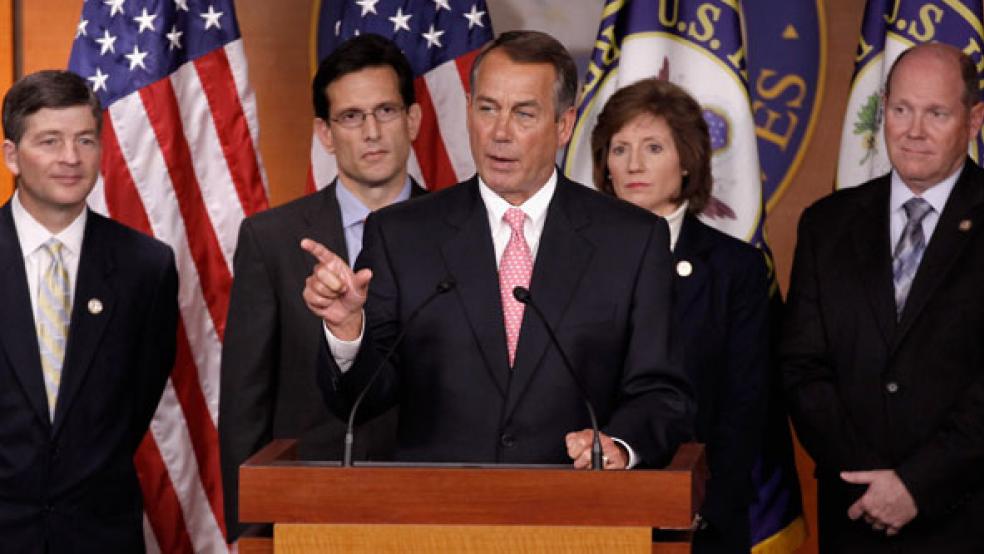House Republicans unveiled a plan Thursday to reduce the corporate and individual tax rate, a goal endorsed by a broad swath of the business community. But they refused to identify specifics in terms of offsetting the cost of the new tax breaks so that their plan would not add to the $1.5 trillion annual deficit.
Republican leaders said they will reduce the corporate and individual tax rates to no more than 25 percent, compared with the current 35 percent. The plan would also allow American businesses to bring back their overseas profits without having to pay a tax penalty. This would essentially align the U.S. tax code with those of other major economies that tax multinational corporations on domestic earnings.
The tax plan was part of the House GOP’s “pro-growth jobs agenda,” as Republicans scrambled to deflect attention from their Medicare proposal —which political analysts said was largely responsible for the stunning Democratic upset of a congressional seat in a heavily Republican New York district. On Thursday, House Speaker John Boehner, R-Ohio., conceded to reporters, “The small part of the reason we didn’t win clearly had to do with Medicare.” Still, he defended the Republican Medicare plan for converting the fee-for-payment system to a subsidized voucher, saying it was the only plan that preserves and protects Medicare for current and future retirees.
Major international corporations and their lobbying groups, led by the Business Roundtable, have been pushing for a comprehensive overhaul of the corporate tax code so that U.S. rates, now the second highest in the world, are more in line with other advanced industrial nations. Critics say that while U.S. rates may be high, the effective rate of taxation is significantly lower because of the numerous exemptions and tax breaks in the code. Exhibit one in their brief is General Electric, which last year paid no corporate income tax.
Both the Obama administration and many Democrats on Capitol Hill have endorsed corporate tax reforms that would move the U.S. to a so-called territorial tax system, which does not tax the overseas profits of U.S.-based firms. Coupled with lowering overall rates, the reforms, as the Republicans pointed out at their press conference, would encourage U.S. firms to invest more capital in the U.S.
The administration insists, however, that any corporate tax reform be revenue neutral – that is, not worsen the deficit. That will require eliminating some tax breaks and loopholes in the current code, which Republicans have dubbed tax increases.
House aides said Ways and Means Chairman Dave Camp, R-Mich., will be developing legislation that works to close loopholes in the tax code. The GOP plan has not yet been scored by the non-partisan Congressional Budget Office.
“The pro-growth, pro-job creation agenda laid out today includes Camp’s approach to streamline and simplify today’s overly-complex code by restructuring credits and deductions to reduce rates – with a top rate of 25 percent for both individual and corporate rates,” said a Ways and Means spokesperson. “The agenda for comprehensive tax reform keeps revenue at historically sustainable levels – between 18 and 19 percent of our Gross Domestic Product.”
Plan Is Dubbed ‘America’s Job Creators’
House Majority Leader Eric Cantor, R-Va., and nine other Republican leaders joined Boehner Thursday to launch their plan — dubbed “America’s Job Creators.” They say it builds on their vows in the “Pledge to America,” but also repackages some of the same items they approved in their Republican budget last month. While there aren’t a lot of new ideas in the plan, Republican leaders say that’s OK.
“Just because we proposed it in the past does not mean it wasn’t a good idea,” Boehner said. “The fact is we’ve had a lot of good ideas. We are trying to package this in a way where the American people understand what it’s going to take in terms of changing policies here that will create jobs in America. I think the package that we have represents a lot of traditional ideas and new ideas about how to let the private sector to create jobs here.”
The plan also includes new limits on government regulations, encourages all forms of domestic energy production, and supports passage of three pending free trade agreements with Columbia, Panama and South Korea, which they say will create 250,000 jobs.
The Republican leaders said their number one focus is job creation. Boehner dismissed the idea that Republicans have been distracted by the budget battles and contentious discussions over Medicare. “We’ve had a number of economists tell us that if we can cut spending, it will lead to a better environment for job creation in America,” Boehner said. “One of the uncertainties that hangs out there for investors and business people is this $14.3 trillion worth of debt and a budget deficit this year of $1.5 trillion.”
The Republican plan was rolled out hours before the bipartisan House and Senate group, which is headed by Vice President Joseph Biden, met for the fifth time to negotiate a deal to cut spending and raise the debt ceiling to avert the threat of the Treasury defaulting on debt for the first time in U.S. history.
Boehner described the Biden talks as “fruitful” and said he hopes they continue. He reiterated what he said in a speech in New York earlier this month, that in order for Republicans to vote to increase the debt ceiling, “spending cuts should exceed the amount of increase in the debt limit.”
Related Links:
GOP Moves to Reset Debate (Wall Street Journal)
House GOP Leaders Renew Vows with Pledge to America and GOP Budget (CBS News)
House Republicans Roll Out Jobs Plan (MarketWatch)






